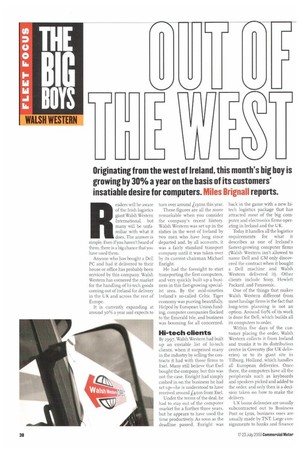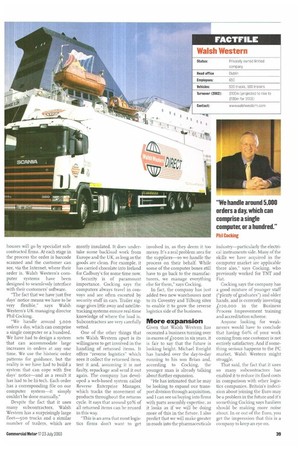Originating from the west of Ireland, this month's big boy
Page 38

Page 39

If you've noticed an error in this article please click here to report it so we can fix it.
is growing by 30% a year on the basis of its customers' insatiable desire for computers. Miles Brignall reports.
Readers will be aware of the Irish logistics giant Walsh Western International, but many will be lathmiliar with what it does. The answer is simple. Even ifyou haven't heard of them, there is a big chance that you have used them.
Anyone who has bought a Dell PC and had it delivered to their house or office has probably been serviced by this company. Walsh Western has cornered the market for the handling of hi-tech goods coming out of Ireland for delivery in the UK and across the rest of Europe.
It is currently expanding at around 30% a year and expects to turn over aroundii.3 om this year.
These figures are all the more remarkable when you consider the company's recent history. Walsh Western was set up in the sixties in the west of Ireland by two men who have long since departed and, by all accounts, it was a fairly standard transport company until it was taken over by its current chairman Michael Enright.
He had the foresight to start transporting the first computers, and very quickly built up a business in this fast-growing specialist area. By the mid-nineties Ireland's so-called Celtic Tiger economy was purring beautifully. Helped by European Union funding, computer companies flocked to the Emerald Isle, and business was booming for all concerned.
Hi-tech clients
By 1997, Walsh Western had built up an enviable list of hi-tech clients, when it surprised many in the industry by selling the contracts it had with those firms to Exel. Many still believe that Exel bought the company, but this was not the case. Enright had simply cashed in on the business he had set up—he is understood to have received around fq.om from Exel.
Under the terms of the deal, he had to stay out of the computer market for a further three years, but he appears to have used the time productively. As soon as the deadline passed, Enright was back in the game with a new hitech logistics package that has attracted most of the big computer and electronics firms operating in Ireland and the UK.
Today it handles all the logistics requirements for what it describes as one of Ireland's fastest-growing computer firms (Walsh Western isn't allowed to name Dell and CM only discovered the contract when it bought a Dell machine and Walsh Western delivered it). Other clients include Sony, Hewlett Packard, and Panasonic.
One of the things that makes Walsh Western different from most haulage firms is the fact that long-term planning is not an option. Around 6o% of its work is done for Dell, which builds all its computers to order.
Within five days of the customer placing the order. Walsh Western collects it from Ireland and trunks it to its distribution centre in Coventry (for UK deliveries) or to its giant site in Tilburg, Holland, which handles all European deliveries. Once there, the computers have all the peripherals such as keyboards and speakers picked and added to the order, and only then is a decision taken on how to make the delivery.
UK home deliveries are usually subcontracted out to Business Post or Lynx, business ones are usually made by TNT. Large consignments to banks and finance houses will go by specialist subcontracted firms. At each stage in the process the order is barcode scanned and the customer can see, via the Internet, where their order is. Walsh Western's computer systems have been designed to seamlessly interface with their customers' software.
"The fact that we have just five days' notice means we have to be very flexible," says Walsh Western's UK managing director Phil Cocking.
"We handle around 5,000 orders a day, which can comprise a single computer or a hundred. We have had to design a system that can accommodate large increases in orders at any one time. We use the historic order patterns for guidance, but the reality is we have had to build a system that can cope with five days notice—and as a result it has had to be hi-tech. Each order has a corresponding file on our computer system—it simply couldn't be done manually."
Despite the fact that it uses many subcontractors, Walsh Western has a surprisingly large fleet-5c,o trucks and a similar number of trailers, which are
mostly insulated. It does undertake some backload work from Europe and the UK. as long as the goods are clean. For example, it has carried chocolate into Ireland for Cadbury's for some time now.
Security is of paramount importance. Cocking says the computers always travel in convoys and are often escorted by security staff in cars. Trailer signage gives little away and satellitetracking systems ensure real-time knowledge of where the load is. Subcontractors are very carefully vetted.
One of the other things that sets Walsh Western apart is its willingness to get involved in the handling of returned items. It offers "reverse logistics" which sees it collect the returned item, test it and, assuming it is not faulty, repackage and send it out again. The company has developed a web-based system called Reverse Enterprise Manager, which tracks the movement of products throughout the returns cycle. It says that around 5o% of all returned items can be reused in this way.
"Ibis is an area that most logistics firms don't want to get involved in, as they deem it too messy. It's a real problem area for the suppliers—so we handle the process on their behalf. While some of the computer boxes still have to go back to the manufacturers, we manage everything else for them," says Cocking.
In fact, the company has just added two new warehouses next to its Coventry and Tilburg sites to enable it to grow the reverse logistics side of the business.
More expansion
Given that Walsh Western has recreated a business turning over in excess of iro om in six years, it is fair to say that the future is looking bright. Michael Enright has handed over the day-to-day running to his son Brian and, according to Cocking, the younger man is already talking about further expansion.
"He has intimated that he may be looking to expand our transport division through acquisition, and I can see us buying into firms with parts assembly expertise, as it looks as if we will be doing more of this in the future. I also predict that we will make greater in-roads into the pharmaceuticals
industry—particularly the electrical instruments side. Many of the skills we have acquired in the computer market are applicable there also," says Cocking, who previously worked for TNT and Fiat.
Cocking says the company has a good mixture of younger staff ("plenty of graduates") and older hands, and is currently investing Doo,000 in the Business Process improvement training and accreditation scheme.
Anyone looking for weaknesses would have to conclude that having Go% of your work coming from one customer is not entirely satisfactory. And if something serious happens to the PC market, Walsh Western might struggle.
That said, the fact that it uses so many subcontractors has enabled it to reduce its fixed costs in comparison with other logistics companies. Britain's indecision about joining the Euro may be a problem in the future and it's something Cocking says hauliers should be making more noise about. In or out of the Euro, you get the impression that this is a company to keep an eye on.
















































































































































































